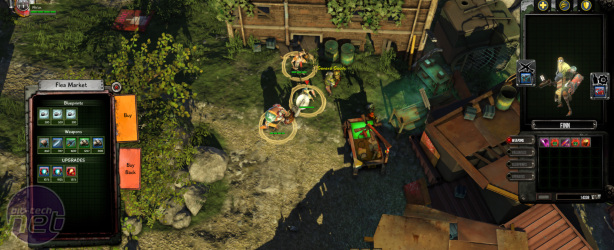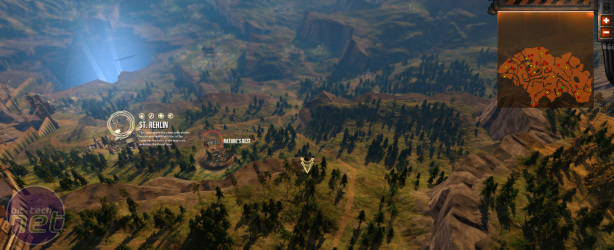
Krater Review
While Krater lacks the polish and finesse of Diablo however, it does compensate for it in a number of other ways - the least of which is that it'll never say Error 37.The inclusion of an overworld map, for example. It's ultimately a small thing which could have easily been replaced with a simple fast-travel system, but at the same time helps enormously at building a visual identity for the world. The constant threat of random encounters is something we oddly value too.
Krater's default health system is worth mentioning too; you have three mercenaries in your group who you can swap and shuffle at will. Outside of combat the health of units regenerates so that you don't need to carry hundreds of health potions around, but within combat health can be rapidly depleted. This is what makes the Medikus class so useful, as he can heal your other two mercs from a distance and ensure they survive their current encounter.
If a merc is knocked down though then even then he can still be revived at the end of the battle, though in doing so he sustains a lingering wound which can only be healed at a hospital. Suffer three wounds at the same time and then that character will die permanently, even on Normal difficulty. So, the game is only ever over if all three mercs fall in one battle or if your troopers die of their wounds one by one.
Depending on your preferences for game balancing, this might initially sound either too wimpy or too hard. Some people don't like the idea of losing their characters forever, while others don't like games where it sounds so hard to fail. Personally, we love the fact that Krater puts both individual characters under threat and the game as a whole. There's enough forgiveness built into the system that you'll only rarely have to repeat whole levels, while also being enough punishment that you have to take things seriously.
Character customisation however, doesn't offer quite such appreciable depth or thought. You're limited to just a small subset of skills and abilities for each class - of which there are four. Each hero can hold an off-hand gadget in addition to his weapon and two skills, with some amusing limitations stopping some classes using specific combinations, but that's about it. Everything beyond that is just boosters and upgrades which you can apply to characters one they've levelled up enough.
On that point it's worth mentioning that Krater bizarrely forces you to abandon characters after a certain amount of time with seemingly random level caps. Some heroes can be taken up to Level 10 or 15, others only to Level 5. It's Krater's most bizarre and least appreciated decision in the entire game, along with the fact that fog of war randomly reappears on maps.
With all this in mind - and especially with Diablo 3 still very much dominating the action-RPG market - it's tempting to just dismiss Krater out of hand. Polish is what's generally asserted to make games like this so good after all, so if that's where Krater falls down then it must really fall down hard, right?
Wrong. There's no doubt that Diablo 3 offers a more honed experience for those who like their games their games to emulate Skinner Boxes, but that doesn't mean that Krater is immediately broken by comparison. It's still a solid-enough action-RPG and one which, for the price, offers a decent amount of time-sink; it's just not on par with the household names which dominate the genre.
Put it this way: Krater isn't anywhere close to being as good as Diablo or Titan Quest, but it's still way, way better than Space Siege.
-
Overall50 / 100


MSI MPG Velox 100R Chassis Review
October 14 2021 | 15:04











Want to comment? Please log in.